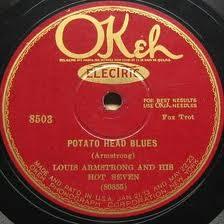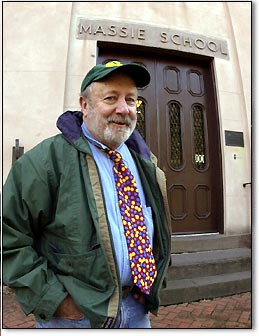The genial man to the left doesn’t exactly resemble Sherlock Holmes or even Dr. Watson, but he’s helped me solve a nagging mystery. He’s Dr. Julius “Boo” Hornstein, longtime resident of Savannah, Georgia, and chronicler of its varied jazz scenes. His research, memories, and appropriate photographs have been published in his book, SITES AND SOUNDS OF SAVANNAH JAZZ (Gaston Street Press). In it, I found more than I’d expected about King Oliver’s last days and his benefactor Frank Dilworth — and anecdotes about Jabbo Smith, Johnny Mercer, Ben Tucker, and other improvising natives.
But that’s not the reason I’m writing this post. Exhibit A:
 Recorded by Louis Armstrong and his Hot Seven in 1927, POTATO HEAD BLUES has been a mystery to many for nearly eighty years. The music itself isn’t mysterious — exultant, rather — but the title has puzzled jazz enthusiasts forever. Some plausibly have thought it came from the teasing way New Orleans musicians made up names for each other based on essential physiognomy — and one of my readers, Frank Selman, wisely suggested that the title was a sly dig at Clarence Williams, whose cranial structure resembled an Idaho Russet.
Recorded by Louis Armstrong and his Hot Seven in 1927, POTATO HEAD BLUES has been a mystery to many for nearly eighty years. The music itself isn’t mysterious — exultant, rather — but the title has puzzled jazz enthusiasts forever. Some plausibly have thought it came from the teasing way New Orleans musicians made up names for each other based on essential physiognomy — and one of my readers, Frank Selman, wisely suggested that the title was a sly dig at Clarence Williams, whose cranial structure resembled an Idaho Russet.
Eighty pages into Dr. Hornstein’s book, we meet Sam Gill — not the Brooklyn-born bassist who recorded and played with Randy Weston, Monk, and Blakey, but a Savannah-born trumpet player who (as a young man) had met the down-on-his-luck Joe Oliver.
But I’ll let Dr. Hornstein lead us back to POTATO HEAD BLUES:
Sam Gill is the kind of guy who likes to tell a story. Consider this. We’re sitting around City Market Cafe one early summer afternoon, and Sam is holding forth. “You ever heard the expression ‘potato head’? You know, ‘So-and-so is nothing but a potato head?’ No one in our group can rightly say that we have, so Sam proceeds to set us straight. ‘Well, the expression goes way back in time and has to do with the parades which frequently took place on West Broad Street. If you were an important figure in the black community, say, a businessman, it was expected of you to have your own band to march in the parades. The bigger the band, the better in terms of your the image. So, every now and then you would beef up your band with one or two good-looking men. The problem was, a lot of the time these fellows looked good, but they couldn’t play. So, you’d put a potato in the bell of their horns and let them march. Of course, no sound came out, but that was okay ’cause you only wanted the guys to look good. That’s how they got to be known as potato heads.”
You have no idea how relieved I am by this riddle, now unraveled for all time. And how prescient of Louis not to have turned to his band and said, “Boys, I have a new song for us: it’s about those street parades in New Orleans. You’ll never forget it: BLUES FOR THE CATS WHO COULDN’T PLAY SO WE HAD TO MAKE SURE WE COULDN’T HEAR THEM PLAY A NOTE EVEN THOUGH THEY WERE SHARP-LOOKING CATS. One, two!”
Thank you, Sam Gill; thank you, Dr. Hornstein — we’ll all sleep better tonight!


That’s a great anecdote! Mr. Potato Head? Fugedaboutit.
Hey thanks for explaining the reasoning for the title of Potato Head Blues. We’ve been playing it for years but never knew the exact meaning of the name of the tune. I actually learned it from an old recording of the Black Eagle Jazz Band. Thank goodness the name has nothing to do with Mr. Potato Head, although we all knew that. He He. Regards, Lee Childs
Nice stories, but wrong physiognomy. They were referring to another “essential” and it wasn’t the head with a face.
Hmmmm! I don’t know, and am tempted to assume a Viennese accent and say, “Young man, sometimes a potato is just a potato.” But thanks for directing our thoughts in a more southerly direction, Bill.
Yes, a good story. However , If you would ask me , I would say that Bill Overton ‘s explation is closer to the truth.
There are several definitions/sources.
From Probert Encyclopeadia
Potato-head is slang for a person with coarse or indistinct features.
Potato-head is slang for a stupid person.
From http://www.answers.com/topic/potato
Calling someone a “potato head” is not a compliment because it means someone who is dense.
From Cassell’s dictionary of slang,
potato-head, n. [mid 19C+] (US) a fool, a simpleton; thus tatur-headed, stupid
According to “The Language Of Jazz” by Neil Powell,
The title of this number [Potato Head Blues] is described by Humphrey Littletton as an “uncomplimentary but jovial reference to some person unknown”; since “potato jack” is illicit liquor, distilled in US prisons, the implication may be alcoholic.
According to the urban dictionary,
1. Potato Head
Someone with a head that looks uncannily like a potato.
‘That Jimbo lad, he’s such a potato headed berk!’
2. Potato head
Racial slur referring to anyone of Irish descent (esp. males)
Get back to work you potato heads!
3. Potato head
Racial slur to Irish people
Hey potato head! Stop yapping and get back to work
According to Cassell
potato jack, n. [1970s+] (US prison) illicit drink distilled from potatoes
If the phrase “potato jack” was introduced in the 1970s, the Armstrong recording has nothing to do with potato jack/alcohol
I imagine there are many more definitions/sources.See More
And people would not see this potato in the end of a horn? The guys weren’t smart enough to just not blow into it? The story does not make a whole lot of sense. Stuffing a bit of potato into the mouthpiece would make more sense since at least it would not be seen and was probably a lot easier to remove.
Begorah! All these years I thought people were complimenting me and now I find out it’s all about my ancestry?
It’s amazing what provokes such heated debate — some would say mashed — on this site, isn’t it? We love you no matter where you came from, Bill.
Just to inject a little irreverence into proceedings – after all, Louis probably christened this number in less time than it’s taken any of us to write our comments – here’s my take on this subject. Clearly Louis was as ahead of his time in terms of song titles as he was with his playing: he was simply anticipating the popularity of a late 20th century kids’ toy. My twin boys have grown up loving what they call the “Mr Potato Head Blues” and I don’t have the heart to explain to them that it wasn’t named for a Toy Story character or classic toy..
My feeling is that the mother of twin boys gets a free pass to believe whatever she likes — and if she’s getting the boys to listen to Louis, the pass also entitles her to free refills of coffee or Earl Grey in addition. I am sure that my readers will agree. Cheers, Michael
it was not that important for even louis could not remember why he named the tune ‘potato head blues’, a few months after he wrote, and had just recorded it for the first time – according to john chilton.
Well, I guess the “Potato Head” legend will rightly never be resolved, but it made a good intro to Sam Gill, the loquacious and talented trumpeter and band master who I intervied shortly before his death. Savannah has a rich jazz heritage and the ladies, gents, and their venues merit more attention. Thanks for the thoughts! Boo Hornstein.
Welcome, Doctor B.! And thanks for the wonderful story — enclosed in a remarkable book. Cheers, Michael
Though I never heard the story, it might expain why my dad, Sam Gill, sometimes referred to others (jokingly) as “potato heads.” He was a great jazz trumpet player and it’s nice to see that he will be remembered as such. I grew up admiring his talent and was heavily influenced by him as I played alongside him a saxophonist.